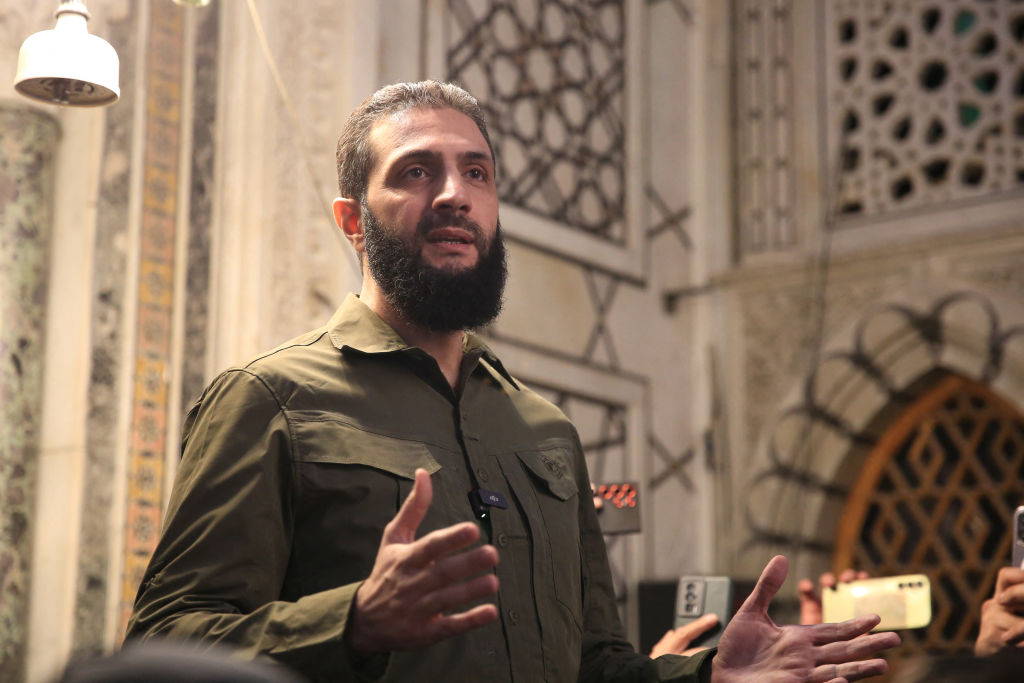By the gates of the great 8th-century Umayyad Mosque in Damascus, a group of Central Asian-looking gunmen stand in the uniform of Hayat Tahrir al-Sham (HTS). It is unclear whether they are visiting or guarding. When I approach, they say they are from ‘East Turkistan’, referring to the Uyghur part of China. Their Arabic is hardly comprehensible, but when I ask in Turkish they speak more fluently.
‘We have been waging jihad in the north in Idlib for ten years,’ the eldest says in a low voice. He looks ten years younger than the age he gives. ‘With the permission of God, we prevailed over the Assad regime. They say we’ll get Syrian citizenship. But we do not want to stay here. God willing, we’ll go and wage jihad against China. We’ll end the misery of our Muslim brothers there.’ He does not want to be photographed but asks me to pray for him and his struggle. The word jihad means ‘struggle’ in Arabic.
A month has passed since the sudden collapse of the Assad regime. HTS, which spearheaded the rebel assault and is now the interim government, always had a large number of foreign volunteer fighters in its ranks. As the former branch of al-Qaeda in Syria, Islamists came from Chechnya, Turkey, Central Asia, and even Europe to fight against a regime that was supported by Iran, Russia, and the Lebanese Hezbollah. The Syrian civil war, in that sense, was a Muslim civil war.
The new government and their leader, Ahmed al-Sharaa (formerly known by his nom de guerre al-Jolani), now presents a very different image to the world. His beard gets shorter by the day, and he has ditched his turban for a suit. His troops seem to be lagging behind, on the moderation front. If some start using Syria as a launchpad to export armed struggle to other countries, the new rulers will struggle to convince the world that they are no longer the feared Islamists they once were. It would also make it harder to get sanctions lifted.
Mousa al-Omar is a Syrian journalist who has close ties to al-Sharaa. We meet him in a hotel lobby, as he returns from a meeting with al-Sharaa, whom he refers to as ‘the leader’. Before sitting down for the interview, he warmly greets billionaire businessmen from the Gulf states sitting at other tables, and kisses a former minister of Bashar al-Assad on the cheeks. He shakes hands with a female colleague, joking ‘You see, we shake hands with women too – I can even hug you,’ and so he did.
‘We have to agree that the foreign volunteers have fought with us for ten years, fought battles on all fronts, and were always in the front line,’ al-Omar says. ‘I believe the new leadership will find a new solution for them. We won’t kick out the people who have fought with us. The leadership believes that we are in their debt. But it should not affect the demography of the country.’
‘We categorically reject that,’ he says, sharply, when I relate my conversation with the Uyghur militiamen. ‘The leadership will crush with an iron fist all those who do not obey its commands. This is a time to build Syria, forget retaliation and revenge, and transition to legal justice. We strictly reject any suggestion that Syria becomes a base for Jihad, or to export militants. We are working towards having zero problems in relations with neighbouring countries.’ Al-Omar answers all questions, but when asked about Israel and its occupation of territories in the south of the country, he only replies: ‘No comment’.
‘The foreign fighters in HTS never carried out a single terrorist attack against the US or EU,’ claims Muhsen al-Mustafa, a Syrian military analyst, visiting his homeland for the first time in a decade. ‘After the fall of Assad, they received promotions [inside the new security forces] from Ahmed al-Sharaa. And later, when we have a constitution, giving them Syrian citizenship will be good for all. They will be settled, so they don’t go and fight in other countries. The new administration cannot send them back to their original countries because they would be arrested and maybe killed under torture.’
‘Good, I think fighting China could be beneficial to the US,’ he says with a smile, when asked about the Uyghur fighters’ plan. ‘One day we might see US support to Turkistan to fight China. As they did before when supporting the Taliban to fight the Soviet Union in the past. Everyone who lost their country dreams of fighting for their homeland. But not now – China is too strong.’
HTS is not the only faction with foreign volunteers. The US-backed Syrian Democratic Forces (SDF) led by Kurdish soldiers have a large number of fighters who travelled there to fight the Islamic State (ISIS) and later Turkey. Close to a dozen British nationals have been killed in their ranks, including Anna Campbell, an anarchist from East Sussex. Turkey and the HTS regard them as terrorists and demand their expulsion from Syria as a precondition for any kind of peaceful settlement with the SDF.
The armed group that was perhaps the most international of all was ISIS itself. Though their main force has been crushed and almost all their territories lost, they still have active fighting units hiding in the desert along the eastern border of Syria. In the Kurdish-controlled northeast, thousands of captured ISIS members are still held in prison camps. Should the region destabilise again, there would be a high risk of the militants regrouping, and launching attacks against local and international targets.
‘ISIS does have a chance in this chaos to regroup. But I think the new administration with HTS at its core has its own method to fight them,’ al-Mustafa says. HTS have clashed with ISIS directly before, and more importantly, they were allies at the beginning of the civil war. ‘They will be arrested, expelled, or killed.’







Comments